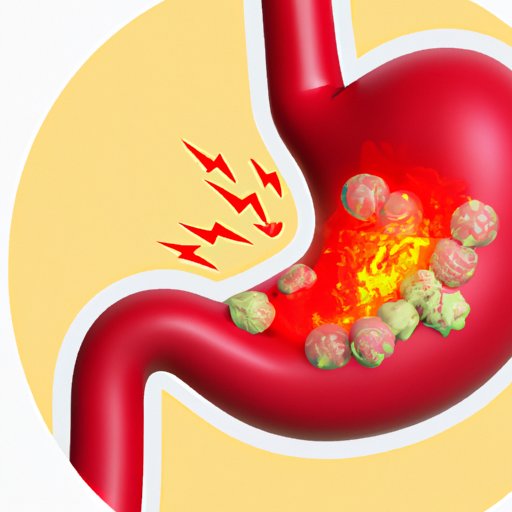
Introduction
A stomach bug, also known as viral gastroenteritis, is an illness that affects the digestive system. It occurs when a virus infects either the stomach, small intestine, or both. Symptoms are typically uncomfortable but not life-threatening. It’s essential to understand the different types of stomach bugs, risk factors, prevention measures, and treatment options available to manage symptoms.
Researching the Different Types of Stomach Bugs
The most common types of stomach bugs include norovirus, rotavirus, and adenovirus. These viruses can be contracted through contact with contaminated surfaces, food, and water. Typically, these viruses spread from person to person in crowded places, including schools, day-care facilities, and hospitals. Symptoms of norovirus include vomiting and diarrhea, along with stomach cramps and fever. Rotavirus is most prevalent in children under the age of five and can cause severe diarrhea, leading to dehydration. Adenovirus, on the other hand, causes symptoms similar to a common cold.
Identifying Risk Factors
Many risk factors increase susceptibility to stomach bugs. Age is one of the most significant risk factors, as children and older adults are more vulnerable to stomach bugs. People with weakened immune systems due to medical conditions like HIV, diabetes, or cancer can also be at higher risk. Moreover, people who travel frequently and eat in unfamiliar places are at higher risk of contracting stomach bugs.
Preventative Measures
The best way to prevent a stomach bug is by practicing good personal hygiene. Always wash your hands before eating and after using the bathroom. It’s also essential to avoid sharing utensils and towels with others to minimize the spread of germs. If you’re planning a trip abroad, make sure to research the water quality in the area you’ll be traveling to. Vaccines against stomach bugs like rotavirus are also available.
Comparing Home vs. Medical Treatment
Most stomach bugs go away on their own within a few days or a week. However, if symptoms persist, it’s necessary to seek medical attention. This is especially true for young children, older adults, and people with weakened immune systems. Medical treatments typically focus on managing symptoms, including medication for nausea, vomiting and rehydration therapy for diarrhea. At home, remedies like ginger tea and the BRAT diet can help alleviate stomach ache, diarrhea, and nausea.
Hacks for Managing Stomach Bug Symptoms
Natural remedies like probiotics, ginger, and peppermint can help relieve stomach bug symptoms. Over-the-counter medications like Imodium can also help with diarrhea. Lifestyle changes can also help alleviate symptoms, including getting plenty of rest, staying hydrated, and avoiding solid foods until symptoms have subsided.
Conclusion
Overall, stomach bugs are not life-threatening but can be unpleasant and uncomfortable. A better understanding of the different types of stomach bugs, risk factors, prevention measures, and treatment options can help prevent, identify, and manage symptoms. By taking steps to prevent a stomach bug, you can avoid the discomfort and inconvenience that comes with this common illness.





